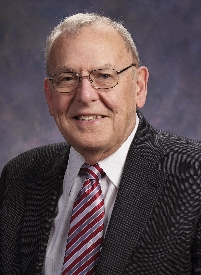University News
New Book in Â鶹´«Ã½ IL Monograph Series Focuses on Hennepin Canal History
August 2, 2012
MACOMB, IL – "The year was 1874, and the Hennepin Canal had achieved national significance and would be built as a federal waterway." Through this succinct declaration, the introduction section of Â鶹´«Ã½ Illinois University Geography Professor Emeritus Donald "Bill" Griffin's new book, "Voices of the Hennepin Canal: Promoters, Politicians, and the U.S. Army Corps of Engineers," sets the stage for this historical account of how this waterway, located in Â鶹´«Ã½ Illinois and opened in 1908, was built and operated until 1951 by the U.S. Army Corps of Engineers. The work combines Griffin's many years of research on the Hennepin Canal with the "words of the people who were part of its history," from such sources as letters, newspaper articles and editorials, documented interviews, Congressional debates, survey reports and more.
"Voices of the Hennepin Canal" — the latest book in the New Â鶹´«Ã½ Illinois Monograph Series and published by the University Libraries and Â鶹´«Ã½ College of Arts and Sciences (CAS) — encompasses the history, beginning in the 1830s, of the defunct waterway now utilized as a recreation area and known as the Hennepin Canal Parkway State Park. The author, who has also served as a member of the since 2006, noted the Hennepin Canal is important not only for its contribution to inland water transportation in the U.S., but also because of the technology used at the time to construct the 75-mile route connecting the Illinois River (upstream from the village of Hennepin) to the Mississippi River west of Milan.
"From a civil engineering standpoint, this was the first time in the United States that concrete was used in building navigation locks and dams. Engineers had done some work in Great Britain with concrete navigation structures, but the methodology used for the Hennepin Canal would lead to the locks built for the Panama Canal," Griffin explained. "The canal, whose initial official name was the 'Illinois and Mississippi Canal,' was the western link in a water route from the Upper Mississippi River to the Atlantic Seaboard."
According to Jeff Hancks, Â鶹´«Ã½ archivist and associate professor at University Libraries, the New Â鶹´«Ã½ Illinois Monograph Series was established in 2006 as a joint initiative between the and the to support studies in the biography, geography, ethnography, literature, politics and culture of the Â鶹´«Ã½ Illinois region. "Voices of the Hennepin Canal" is available for purchase through University Archives.
"The original Â鶹´«Ã½ Illinois Monograph Series [1983-1991] published eight volumes and was well received by the region before it ended due to budgetary constraints. We decided to explore reviving the series, because we believed there are some interesting, important stories from the Â鶹´«Ã½ Illinois region to share with the public. Book publishing is an expensive endeavor, but with the generous financial support of the Haines Family Fund for Regional Studies it was possible to make our dream of re-starting the monograph series a reality," Hancks explained.
He added both he and CAS Dean Susan Martinelli-Fernandez serve as the series editors, while Roger Viadero, the director of the and a professor in the , was the volume editor for "Voices of the Hennepin Canal."
"This collaborative effort came from the natural confluence of Professor Griffin's 30-plus years of scholarship on the planning, construction and operation of the Hennepin Canal with my professional experience as a civil/environmental engineer," Viadero explained. "The result is a book that bridges a broad range of disciplines from geography, to water-resource engineering, political science, history and economics. In this regard, 'Voices' is a great reflection of the Institute's dedication to support multidisciplinary scholarship relevant to Â鶹´«Ã½, the region and beyond."
Viadero also designed the book's front and back covers and noted the book's cover design features a contemporary landscape photo, as well as 1943 image of canal employees.
"My goal was to incorporate a visual representation of the historic 'voices' featured in the manuscript with the more enduring natural setting of the canal channel," he said.
In addition to telling the important story of the Hennepin Canal, Griffin's new book will help fund Â鶹´«Ã½ Foundation Scholarships. He noted a percentage of the profits from book sales will go directly toward student scholarships.
Griffin will also be leading a field tour of the Milan area and three navigation locks of the Hennepin Canal in late September as part of the 2012 (UMRC). The Sept. 26-28 UMRC — organized by Davenport (IA) based River Action, a non-profit organization "dedicated to fostering the environmental, economic and cultural vitality of the Mississippi River and its riverfront in the Quad Cities' region" — is slated to be held at the Â鶹´«Ã½-QC Riverfront campus and at the Stoney Creek Inn in Moline.
According to Martinelli-Fernandez, Griffin's leadership and participation in such activities as representing Â鶹´«Ã½ at the UMRC and working with individual and entities in the area not only provide important contributions to the Â鶹´«Ã½, but also to the Â鶹´«Ã½ Illinois region.
"I want to thank Trustee Bill Griffin for his vision and for his on-going support of Â鶹´«Ã½ and CAS initiatives through his collaboration with the diverse group of stakeholders from the government, community and the academy who are dedicated to enhancing environmental, economic and community sustainability along the Upper Mississippi River. Dr. Griffin teaches us that the river is our home; the river is our teacher; the river is our path to sustained progress as individuals and as communities," she said.
To purchase copies of the "Voices of the Hennepin Canal: Promoters, Politicians, and the U.S. Army Corps of Engineers," contact University Archives at (309) 298-2717. Cost of each copy is $35, plus $2.71 sales tax for Illinois residents.
For more information about the New Â鶹´«Ã½ Illinois Monograph Series, contact Hancks at (309) 298-2717 or via email at JL-Hancks@wiu.edu.
Posted By: Teresa Koltzenburg (Â鶹´«Ã½News@wiu.edu)
Office of University Communications & Marketing



Connect with us: